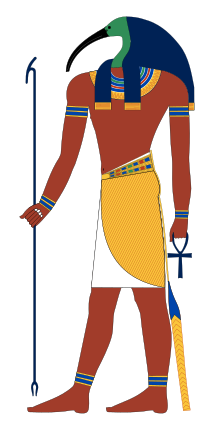Thoth (god)
| Thoth | |
|---|---|
| God of Knowledge, the Moon, Measurement, Wisdom, the Alphabet, Records, Thought, Intelligence, Meditation, the Mind, Logic, Reason, Reading, Hieroglyphics, Magic, Secrets, Scribes, and Writing | |

Thoth, in one of his forms as an ibis-headed man
|
|
| Major cult center | Hermopolis |
| Symbol | Moon disk, papyrus scroll, reed pens, writing palette, stylus, ibis, baboon, scales |
| Consort | Seshat,Ma'at, Nehemtawy |
| Offspring | Seshat in some accounts |
| Parents | None (self-created); alternatively Neith or Ra or Horus and Hathor |
Thoth or Djehuti (/ˈθoʊθ/ or /ˈtoʊt/; from Greek Θώθ thṓth, from Egyptian ḏḥwty, perhaps pronounced */tʃʼiħautiː/ or */ɟiħautiː/, depending on the phonological interpretation of Egyptian's emphatic consonants) was one of the deities of the Egyptian pantheon. In art, he was often depicted as a man with the head of an ibis or a baboon, animals sacred to him. His feminine counterpart was Seshat, and his wife was Ma'at.
Thoth's chief temple was located in the city of Khmun, later called Hermopolis Magna during the Greco-Roman era (in reference to him through the Greeks' interpretation that he was the same as their god Hermes) and Shmounein in the Coptic rendering, and was partially destroyed in 1826 CE. In that city, he led the Ogdoad pantheon of eight principal deities. He also had numerous shrines within the cities of Abydos, Hesert, Urit, Per-Ab, Rekhui, Ta-ur, Sep, Hat, Pselket, Talmsis, Antcha-Mutet, Bah, Amen-heri-ab, and Ta-kens.
...
Wikipedia
